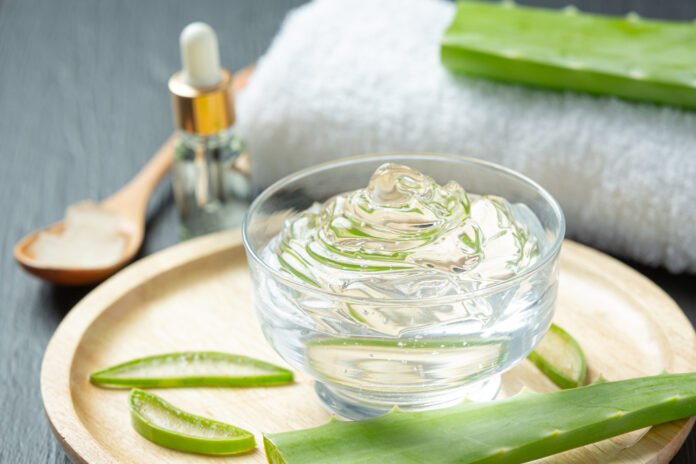Discover the remarkable benefits of Aloe Vera, a celebrated medicinal and cosmetic plant renowned for its ability to treat various skin conditions, including frostbite, psoriasis, and cold sores. The clear, potent gel found within its leaves is a powerhouse of approximately 75 active constituents, such as vitamins, enzymes, minerals, and amino acids, all working to enhance your skin’s health.
Top 9 Aloe Vera Benefits for Glowing Skin
1. Soothes and Heals Sunburn

With its natural moisturizing and healing properties, research confirms that aloe vera is effective in healing first and second-degree burns. Its rich antioxidant content, particularly the protein metallothionein, provides a protective shield against UV damage. The plant’s deep hydrating qualities also help prevent the peeling that often follows a sunburn, keeping your skin soothed and moisturized.
2. Fades Dark Spots and Hyperpigmentation

Struggling with stubborn dark spots from sun exposure, acne, or aging? A compound in aloe vera called aloesin can significantly lighten them. A study revealed that applying aloe vera gel four times a day for 15 days effectively treated UV-induced and post-acne hyperpigmentation, revealing a more even skin tone.
3. Deeply Moisturizes the Skin
Aloe vera is exceptionally hydrating. Its innermost layer contains mucopolysaccharides, which are key to locking moisture into your skin. Topical application of aloe vera has been shown to increase the water content of the outermost layer of the skin, making it an excellent moisturizer for all skin types, especially dry skin.
4. Revitalizes as a Restorative Scalp Mask
The moisturizing, anti-inflammatory, and antimicrobial benefits of aloe vera extend to your scalp. Using it as a scalp mask can soothe irritation, gently exfoliate dead skin cells, and strengthen hair follicles. This leads to smoother, shinier hair and a healthier scalp environment.
5. Promotes Healthy Aging

Well-hydrated skin is the secret to a youthful appearance. Aloe vera not only replenishes and retains moisture but also stimulates the production of hyaluronic acid, collagen, and elastin. This helps to restore skin elasticity and reduce the appearance of fine lines and wrinkles, giving you a firmer, more supple complexion.
6. Helps Clear Acne Breakouts

Leverage the antimicrobial and anti-inflammatory properties of aloe vera to combat acne. As a natural source of salicylic acid, it helps to clear out blackheads and whiteheads. Studies have shown that using aloe vera cream in conjunction with traditional acne treatments like tretinoin cream can be highly effective in treating both inflammatory and non-inflammatory acne.
7. Soothes Psoriasis and Eczema
Aloe vera’s antiseptic properties act against bacteria, fungi, and viruses, making it beneficial for skin with a compromised barrier, such as in psoriasis and eczema. Applying aloe vera cream can help reduce the redness, scaling, and irritation associated with these conditions.
8. Treats and Prevents Dandruff
Effectively address the irritation, scaliness, and flakiness of dandruff, a form of seborrheic dermatitis, with aloe vera. Its antibacterial and antifungal properties work to treat and prevent dandruff, promoting a clean and healthy scalp.
9. Helps Fade Stretch Marks
Consistent use of aloe vera can effectively reduce the appearance of stretch marks and prevent new ones from forming. Its skin-restoring and anti-inflammatory qualities boost the production of hyaluronic acid, elastin, and collagen, which are essential for repairing and maintaining skin elasticity.
How to Use Aloe Vera for Your Skin
For the best results, opt for pure aloe vera gel without added ingredients like alcohol or other chemicals that can be harsh on the skin. The freshest gel comes directly from an aloe vera plant at home.

- As a Face Wash: After washing your hands, apply a small amount of gel to your face in a circular motion. Rinse with cool water and pat dry.
- As a Skin Toner: Mix two parts water with one part aloe vera gel. Store it in an airtight bottle in the refrigerator. Apply to a clean face with a cotton ball.
Potential Risks of Using Aloe Vera on Skin
While generally safe, applying aloe vera gel may cause a temporary stinging or burning sensation on sensitive or dry skin. To avoid dryness, it’s best to rinse the gel off after a few minutes. Always perform a patch test on a small area of your skin first to check for any allergic reactions or sensitivity.
The Takeaway
Aloe vera is a versatile and effective natural remedy for a wide range of skin concerns, from dryness and acne to more persistent conditions like eczema and psoriasis. Whether you use the gel directly from the plant or a store-bought, chemical-free version, incorporating aloe vera into your skincare routine can lead to healthier, more radiant skin.





